Focus and Scope
Disparidades. Revista de Antropología is the continuation of the Revista de Dialectología y Tradiciones Populares (1945-2018), the oldest Spanish periodical dedicated to social and cultural anthropology. Aimed at an international readership specialized in that discipline, it is currently a scientific publication that especially values innovative contributions in anthropological research, understood in a broad and plural theoretical and methodological sense.
The journal publishes original articles that, in addition to contributing to anthropological knowledge, enrich the critical debate among researchers, with special attention to theoretical and methodological contributions and field ethnography.
Every issue contains a section entitled “Articles”, while alternate issues include the "Emerging themes" and "Cartographies" sections. The journal also includes several sections that will be published sporadically: "En pocas palabras", "Fuentes y testimonios", "En tierra de nadie", "Tientos bibliográficos" and "Notas de libros".
Disparidades. Revista de Antropología considers ethnography as an "emergent" and "dense" process in which feedback dynamics are established between theory and practice, between reality and text, between research designs and changing situations, between field scenarios and application of research techniques, between the position of the researcher and that of the informants, between researchers and the audiences of their texts. Therefore, from a commitment with public engagement, we give priority to texts that contribute to charting the field of anthropology in the present and the future. In this sense, the journal publishes articles that (a) are anchored in ethnographic fieldwork, from local studies to cyberspace, incorporating from classical to the most innovative methods; (b) develop solid and updated theoretical frameworks to understand and interpret empirical data in a globalizing and comparative framework; and (c) take risks and are capable of opening or outlining new horizons for the discipline, always within the maximum theoretical and methodological rigor.











